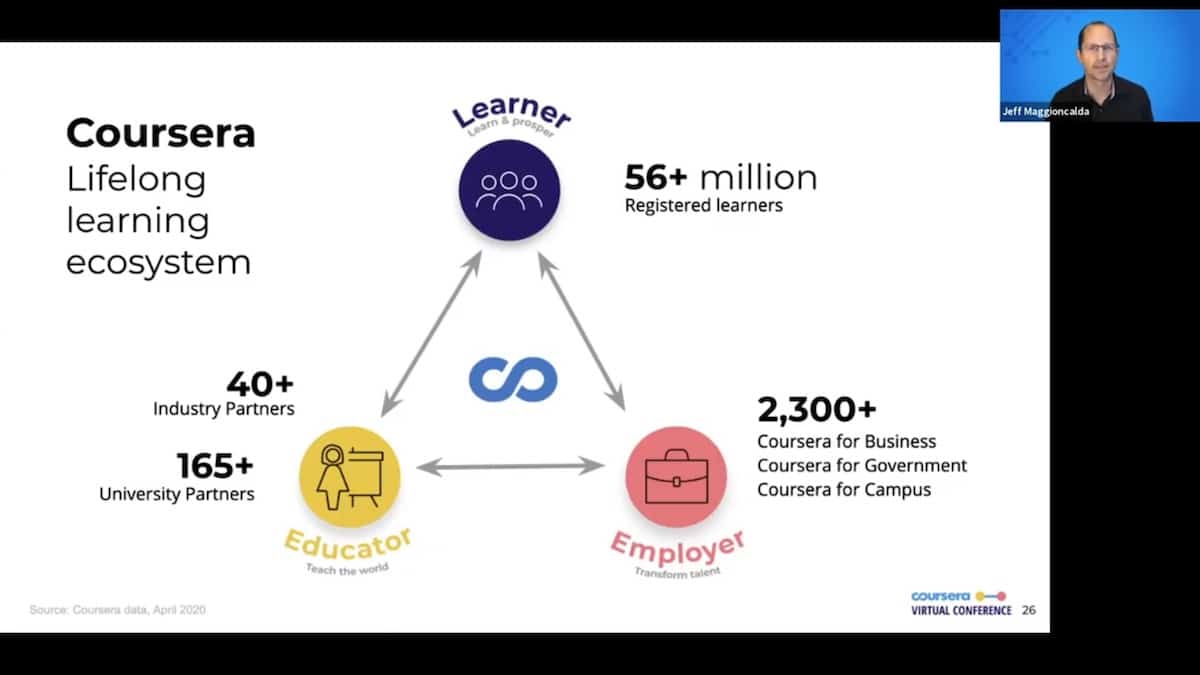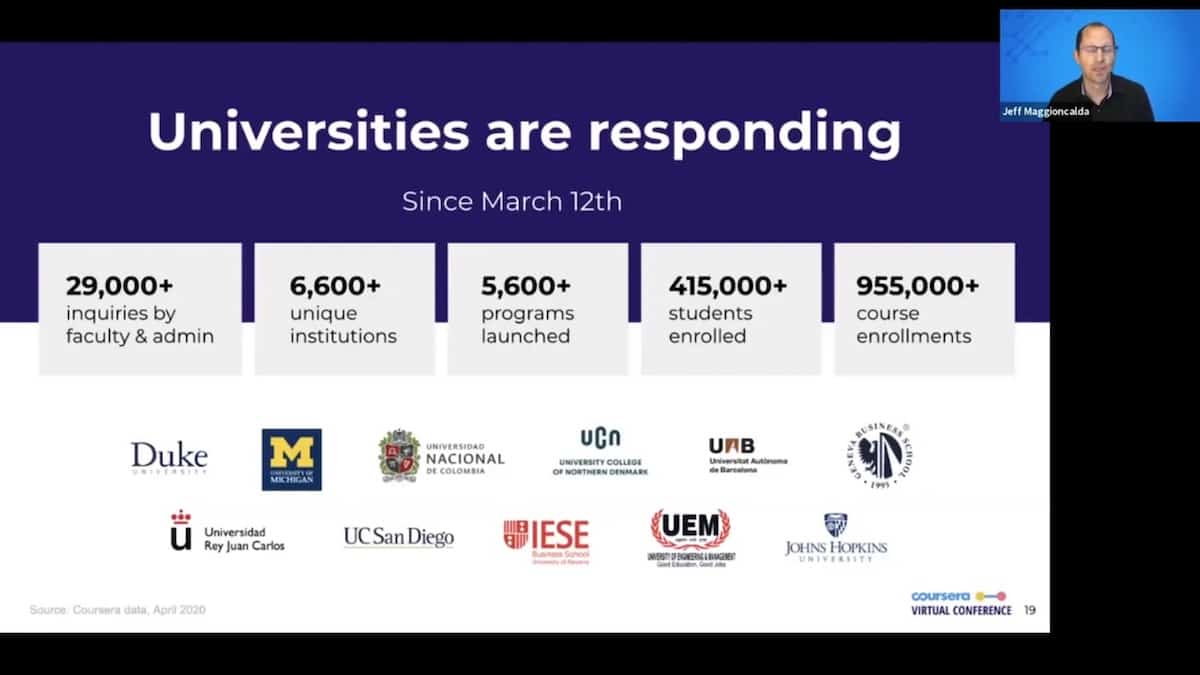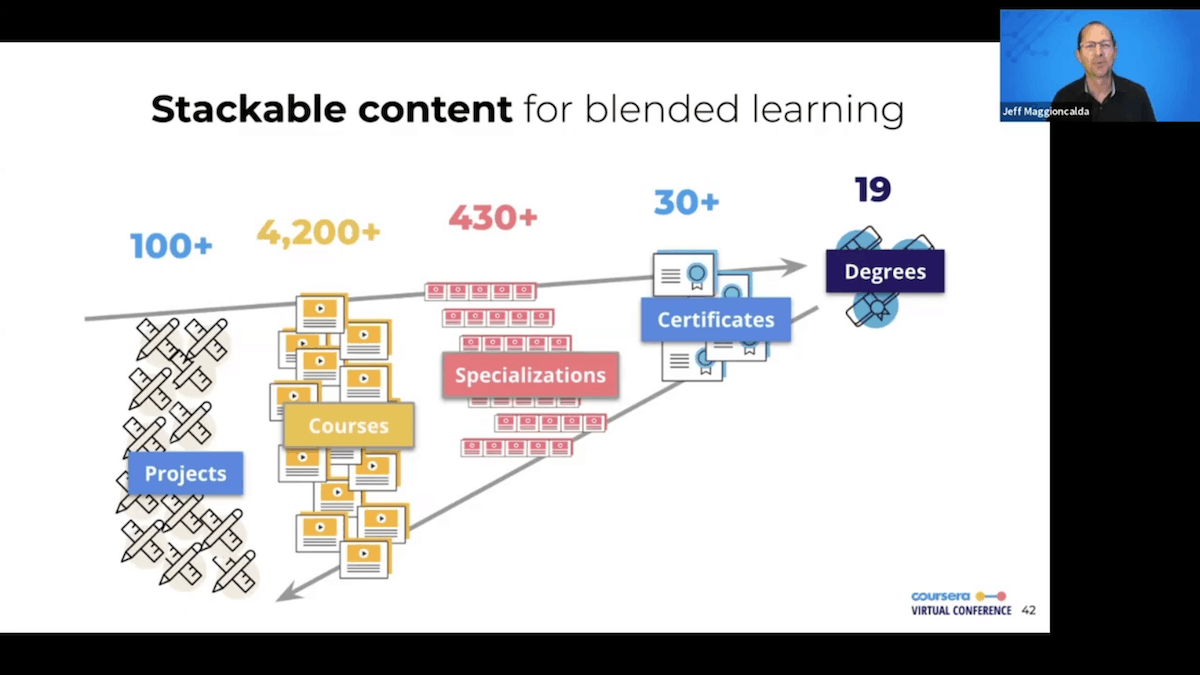Highlights from Coursera Partners Conference 2020
The conference included presentations from Coursera’s co-founders Daphne Kohler and Andrew Ng; Coursera’s CEO Jeff Maggioncalda; and Coursera’s product and data teams.

Coursera’s annual partners conference is usually limited to the provider’s partners. Non-partners, like Class Central, are not able to attend.
But due to the pandemic, many conferences, including Coursera’s, are going fully online. Class Central has been keeping track of these virtual conferences here. By opening the conference to everyone, the event was able to gather its largest audience so far: over 3200 attendees from 78 countries.
As first-time attendees, our first impression was that of a polished sales pitch directed firmly towards universities and extolling the benefits of partnerships with Coursera.
The conference included presentations from Coursera’s co-founders Daphne Kohler and Andrew Ng; Coursera’s CEO Jeff Maggioncalda; and Coursera’s product and data teams.
The conference also included a couple of panels with participation from some of Coursera’s university partners; former Coursera CEO and ex-Yale President, Rick Levin; and US Under Secretary of Education, Ted Mitchell.
The conference program focused on Coursera’s products and its response to the ongoing COVID-19 pandemic. I’ve been keeping track of this in our comprehensive article How Different MOOC Providers are Responding to the Pandemic.
By The Numbers

In my view, Coursera’s CEO Jeff Maggioncalda gave the most informative talk, sharing various numbers and stats.
Here are some of the pandemic related statistics:
- 10.3 million enrollments in 30 days, 644% up compared to last year.
- 5 million+ new user registrations post COVID-19.
- 1.6 million enrollments in 2020 in Yale’s The Science of Well-Being.
- 415,000+ students and 6,600+ unique institutions on Coursera for Campus.
And here are some non-pandemic related statistics:
- 56+ million total students, 80% of them outside the US. Here are the top five countries:
- US — 12M
- India — 6.5M
- China — 3.2M
- Mexico — 3.1M
- Brazil — 2.4M
- Degree Enrollments:
- 300+ students in the University of Colorado Boulder’s online master’s degree in electrical engineering.
- 2000+ students in the University of London’s online bachelor’s degree in computer science.
- 2,300+ Coursera for Business customers.
Product Updates

Multiple speakers emphasized Coursera for Campus, which was officially announced last year in October.
Coursera for Campus is central to the company’s pandemic strategy, allowing any university to make most of Coursera’s catalog available to up to 5,000 students for free. Over 6,600 unique institutions have enrolled.
Coursera also boosted its offering by announcing two new products:
- CourseMatch, a service that matches a university’s on-campus courses to equivalent courses on Coursera.
- Live2Coursera, a tool that enables instructors to embed Zoom lectures in their courses. This feature will launch later in 2020.
The company also highlighted the role data and machine learning play in the learning experience. Personally, as a Coursera learner since 2012, I haven’t seen much benefit from these “data innovations”.
You can find the product updates presentation here and additional details in this blog post.
New Degrees and MasterTrack

Coursera announced two new online degrees:
- Master of Science in Population and Health Sciences from the University of Michigan. The first cohort is expected to start in 2020.
- Master of Data Analytics Intelligence from the Universidad de los Andes (Uniandes). The first cohort is expected to start in August 2021.
They also announced seven new MasterTrack certificates:
- AI and Machine Learning from Arizona State University
- Cybersecurity from Arizona State University
- Software Engineering from Arizona State University
- Blockchain Applications from Duke University
- Principles of Agile and Automated Software Engineering from Uniandes
- Social Work: Practice, Policy, and Research from the University of Michigan
- Sustainability and Development from University of Michigan
- UX Design from University of Minnesota
All the conference talks can be found here:
- Welcome Remarks from Daphne Koller, Coursera Co-Founder
- Coursera Keynote from Jeff Maggioncalda, Coursera CEO
- Coursera for Campus: Supporting Universities Around the World During the COVID-19 Crisis
- Coursera Product Innovations
- The New Reality and Impact of COVID-19 on Higher Education
- Closing Remarks from Andrew Ng, Coursera Co-Founder
Tags







Muvaffak GOZAYDIN
I gave up any hope from universities regarding low cost degree programs .
It seems Coursera edx are more business minded and more intelligent than administrators of the universities .
Therefore they will find a solution
low cost degree programs by first class universities at $ 100 per course .
Work hard man . Those first class universities do not realise that they can make more money with online degree programs at $ 100 per course .
Otherwise China will win .
Suparn Patra
Maybe these could be helpful to you:
https://www.classcentral.com/report/coursera-free-certificate-covid-19/
https://www.classcentral.com/report/futurelearn-free-certificates/
https://www.classcentral.com/report/free-online-learning-coronavirus/